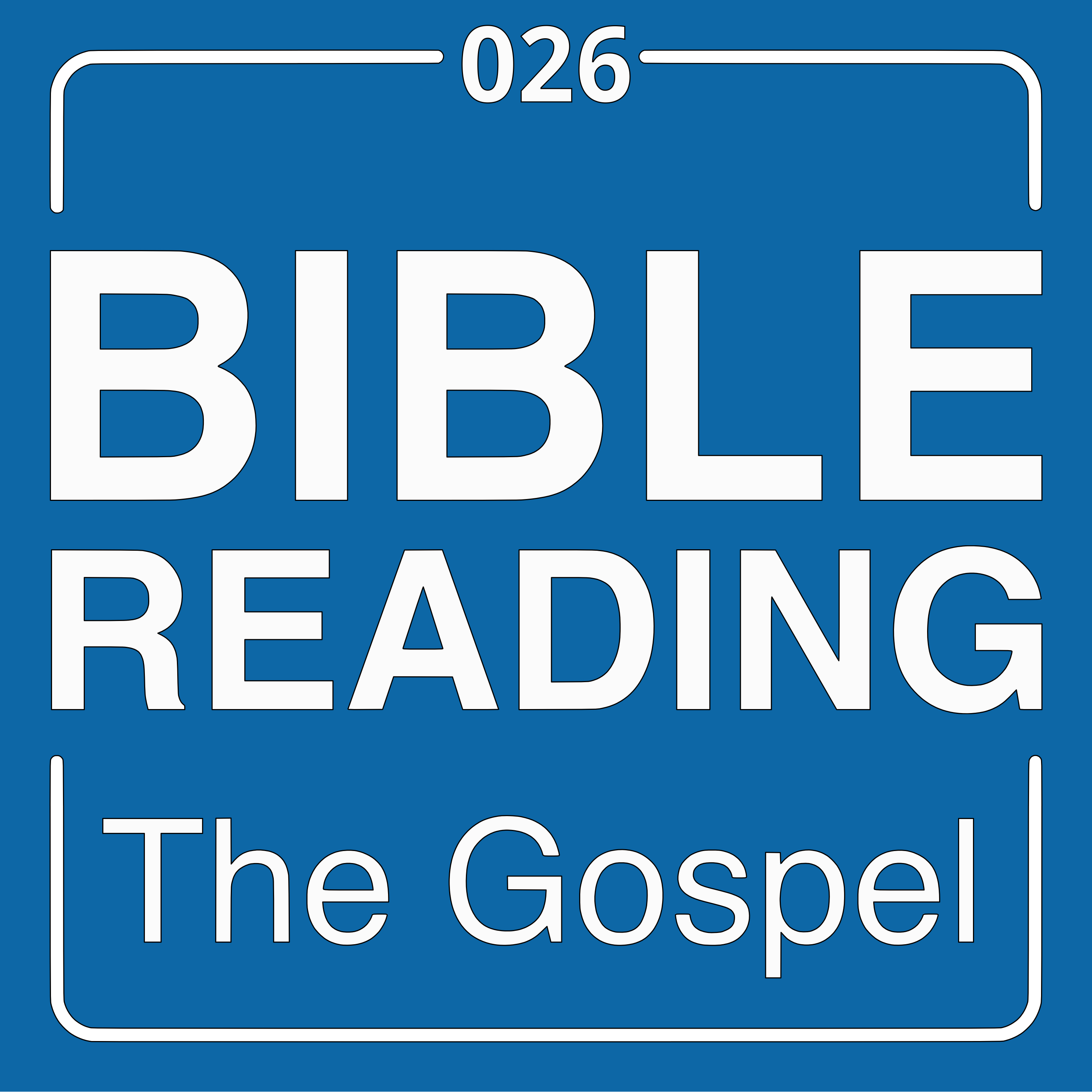Episode Transcript
[00:00:24] Speaker A: Hello, I'm Josh.
[00:00:25] Speaker B: And I'm Gabriel.
[00:00:26] Speaker A: And today, on reading the Gospel, we are studying the event of the man born blind. This is found in the Gospel of John, chapter nine. Follow along with us in verse one.
[00:00:41] Speaker B: As he passed by, he saw a man blind from birth. And his disciples asked him, rabbi, who sin sinned, this man or his parents that he was born blind?
Jesus answered, It was not that this man sinned or his parents, but that the works of God might be displayed in him.
We must work the works of him who sent me. While it is day. Night is coming when no one can work.
As long as I am in this world, I am the light of the world.
Having said these things, he spit on the ground, made mud with a saliva. Then he anointed the man's eyes with the mud and said to him, go wash in the pool of Siloam, which means scent. So he went and washed and came.
[00:01:41] Speaker A: Back, saying the neighbors and those who had seen him before as a beggar were saying, is this not the man who used to sit and beg? Some said it is he? Others said, no, but he is like him. He kept saying, I am the man. So they said to him, then, how were your eyes opened? And he answered, the man called Jesus made mud and anointed my eyes and said to me, Go to Siloam and wash. So I went and washed and received my sight. They said to him, Where is he? He said, I do not know.
[00:02:20] Speaker B: They brought to the Pharisees the man who had formerly been blind. Now it was a Sabbath day when Jesus made the mud and opened his eyes. So the Pharisees again asked him how he had received his sight. And he said to them, he put mud on my eyes and I washed, and I see.
Some of the Pharisees said, this man is not from God, for he does not keep the Sabbath.
But others said, how can a man who is a sinner do such things?
And there was a division among them. So they said again to the blind man, what do you say about him since he has opened your eyes?
And he said, he's a prophet.
[00:03:05] Speaker A: The Jews did not believe that he had been born blind and had received his sight until they called the parents of the man who had received his sight and asked them, is this your son who you say was born blind? How then does he now see? His parents answered, we know that he is our son and that he was born blind. But how he now sees, we do not know. Nor do we know who opened his eyes. Ask him. He is of age. He will speak for himself. His parents said these things because they feared the Jews. For the Jews had already agreed that if anyone should confess Jesus to be Christ. He was to be put out of the synagogue. Therefore his parents said, he is of age. Ask him.
[00:03:54] Speaker B: So for the second time, they called a man who had been blind and said to him, give glory to God. We know that this man is a sinner.
He answer, Whether he is a sinner, I do not know. One thing I do know, that though I was blind, now I see.
They said to him, what did he do to you? How did he open your eyes? He answered to them, I have told you already, and you would not listen.
Why do you want to hear it again?
Do you also want to become his disciples?
And they reviled him, saying, you are his disciple, but we are disciples of Moses. We know that God has spoken to Moses, but as for this man, we do not know where he comes from. The man answered, Why, this is an amazing thing.
You do not know where he comes from. And yet he opened my eyes. We know that God does not listen to sinners. But if anyone is a worshipper of God and does his will God listens to him. Never since the world began has it been heard that anyone opened the eyes of a man born blind.
If this man were not from God, he could do nothing.
They answered to him, you were born in utter sin and would you teach us? And they cast him out.
[00:05:31] Speaker A: Jesus heard that they cast him out and having found him, said, do you believe the Son of man? He answered, and who is he, sir, that I may believe in him? Jesus said to him, you have seen him, and it is he who is speaking to you. He said, Lord, I believe. And he worshiped him. Jesus said, for judgment, I came into this world that those who do not see, may see, and those who see may become blind. Some of the pharisees near him heard these things and said to him, Are we also blind? Jesus said to them, if you were blind, you would have no guilt. But now that you say, we see, your guilt remains.
So this story here is another miracle. But there's a whole lot more information behind it. It begins with this question who sinned? This man or his parents that he was born blind?
[00:06:32] Speaker B: It seems that the disciples, as the majority of the population those times connected blindness with sin. And because this man was born blind and he could not sin before being born, so they asked the question is this blindness connected to his sins or the sin of his parents?
[00:07:01] Speaker A: Jesus says, it's not this man's sin or the sins of his parents, but that the works of God might be displayed in him. So does God make people be born blind for God's own works?
For his glory?
[00:07:22] Speaker B: Absolutely not.
God does not need evil to reveal his goodness. To reveal his character.
It is in this context of a fallen human race, it is in this context of a world tainted by sin that the glory of God is being revealed. I think God uses extreme situations like this to reveal his supreme glory and kindness and healing power and longer. The way to healing stronger, more visible is the power of God.
[00:08:09] Speaker A: Yeah, I think that's very important to understand. And we look at someone who's born blind, and we think, well, they have less, but it doesn't necessarily mean that they have less.
They have a different experience, and they can glorify God. And when we see someone who has some kind of physical handicap, who praises God and gives glory to Him, it has more impact. Even when we see someone who's come from the bottom and comes all the way up to the top, they're held in higher esteem than someone who receives their position from their parents or something.
[00:08:57] Speaker B: And your perspective is being demonstrated right here in this story. Starting with verse 24, the Jewish leaders, the Pharisees, called this man the second time, and he answered in a very intelligent way. And that response was not developed in a second after he was healed, but this was developed in those years where he was not able to perceive the reality, to communicate to people around. And in verse 30, he said, this is an amazing thing.
You do not know where he comes from. And yet he opened my eyes. We know that God does not listen to sinners. But if someone is a worshipper of God and does his will God listens to him. Never since the world began has it been heard that anyone opened the eyes of a man born blind. If this man were not from God, he could do nothing. That is an amazing sermon, and it is by contrast with the Pharisees. This is an amazing logic of a man born blind who shines out of that darkness. And the Pharisees, who have been taught at the best rabbinical school, who knew Bible verses and maybe other teachings by heart, they are not able to figure out. So you see, that wisdom that comes from above is being manifested in this man born blind in an amazing way. It is supporting exactly what you just said. Yeah.
[00:10:37] Speaker A: Here's a question in that response, the man says, we know that God does not listen to sinners.
Does God listen to sinners or not? Is this man right here?
[00:10:50] Speaker B: God is willing to listen to anyone's prayers.
Sometimes God even anticipates the desire of the heart, and he will respond before we open the mouth to utter those requests. But I think this is a special request to heal a man who was born blind.
That would not be normally possible. In the same way, on Mount Carmel in the Old Testament, when the Baal and Esherat's priest prayed, nothing happened.
But when Elijah prayed, something happened. And the fire came down from heaven. So these are special occasions when the glory of God is manifested in public. God is very interested that these events are not confusing. They are very clear.
[00:11:49] Speaker A: And we have evidence with the disciples and in acts with other people claiming to be disciples where those who are doing public work when they are doing it in sin and selfish reasons, we don't see the actions, we see rebukes.
Yeah. What does this passage tell us about God?
[00:12:15] Speaker B: The way Jesus Christ answered the disciples initial question it is not the sin of himself or his parents, but he was born like this so that God's work might be displayed in him. Mightily?
Based on this, I see a God who is looking at any possible opportunity to reveal his character, to reveal his power, including in this situation, his healing power. He is using for any opportunity to grab our attention, to bring us closer to him, to share the good news that if we remain in darkness we will be slaves to sin, but if we come into the light, we can become the sons and daughters of God.
This is how I see God in here, looking for any possible situations to advance the mission of his kingdom.
[00:13:18] Speaker A: How is this passage speaking to us today and what are we going to do about it? For me, I see here a personal Jesus. At the end, when this blind man is cast out of the synagogue, jesus goes and seeks him out and he finds him.
He's wanting to make sure he's connected to him. And even in the conversation he's linking Godly things to experiences, personal experiences. This man has. He's talking for judgment. I came into the world that those who do not see may see and those who see may become blind.
He's reaching this man's heart, talking this man's language. And God does that for all of us. He reaches us on different levels in different ways.
I can't tell you how many times I preach a sermon and someone at the end comes out and says I needed to hear that. And what they share has nothing to do with what I preached. But they heard a message from God that day that spoke to them in their way, despite what I had planned.
[00:14:31] Speaker B: God's.
[00:14:32] Speaker A: Very personal God.
[00:14:34] Speaker B: The way this story spoke to me is in the last verse when some of the Pharisees said, are we also blind?
And Jesus said, if you were blind, you'd have no guilt. But now that you say we see, your guilt remains. This statement spoke directly to me. I've been asking myself, Lord, is it possible that I am blind for a specific situation or behavior in my life or missing a desire to improve? Because we are called by God to put all our talents that we receive from Him into the bank to increase them, to develop all the powers and the gifts and the talents that we have from God. So this is the question that I take with me from this passage. Am I also blind, Lord? Please speak to me.
Show me the light. Show me the way. And give me the power to step out of darkness into the light of your presence daily.
[00:15:42] Speaker A: Let's pray. Father God, if we are blind, please reveal that to us. Please open our eyes that we may see. May we not be content with living in darkness? May we not walk around in ignorance claiming that we can see when we may be blind? I pray, Father, that we will constantly surrender to you and we will seek Your will every moment. In Jesus name. Amen.



